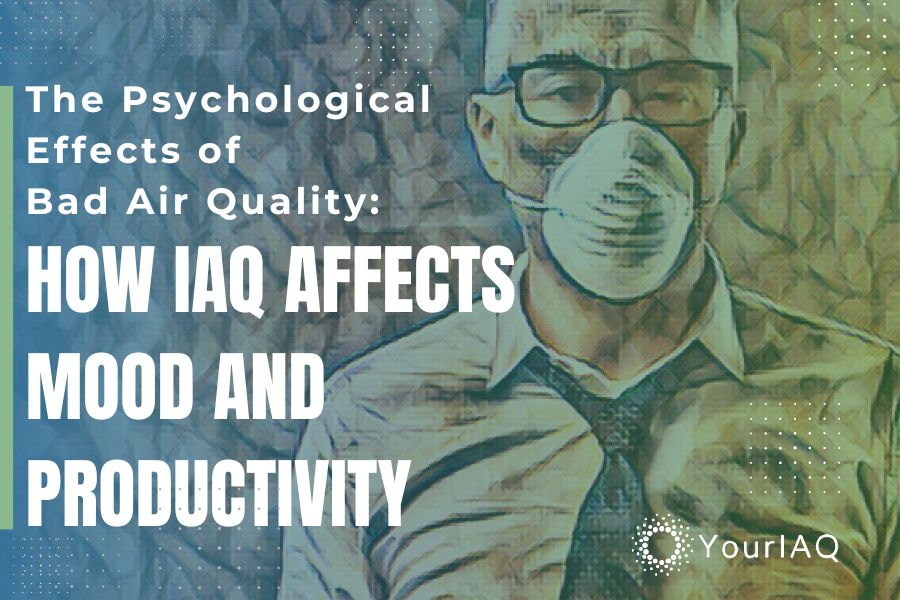
What are the effects of bad air quality on our physical health? We often consider respiratory problems and allergy flare-ups. However, an increasing body of research reveals a disturbing link between air pollution and our mental well-being. The air we breathe, particularly the presence of fine particulate matter (PM 2.5), can have a significant impact on our mood, concentration, and overall cognitive function.
Indoor Air Quality (IAQ) is a critical factor that influences our ability to thrive, both physically and mentally. Experts like Marc Weisskopf, professor of environmental epidemiology and physiology at the Harvard T.H. Chan School of Public Health, are dedicated to understanding the complex ways in which air pollution harms our health.
Traditionally, the harmful effects of particulate matter were thought to enter the body primarily through the lungs and cardiovascular system. However, new research highlights a newly discovered, disturbing pathway:
“When you breathe in through your nose, you’re smelling things because you have neurons that are kind of sticking out in the world, exploring it that way. And we now understand that some particles, or aspects of particles, can actually get transported directly back into the brain—skipping the lungs and the cardiovascular system”.
This revelation sheds light on the insidious nature of air pollution. While the physical symptoms, such as headaches, fatigue, and respiratory issues, are well-documented, the psychological ramifications are just as severe and warrant attention.
Adding to this concern, Dr. Ian Mudway, a lecturer at Imperial College London and a member of the research team, provided further insight into the broader implications of these findings in his interview with The Guardian. He draws attention to the often-overlooked impact of air pollution on mental health, particularly in urban settings where mental health disorders are more prevalent.
“There is now an increasing body of evidence suggesting air pollution isn’t great for the brain either,” Mudway comments. This viewpoint not only underscores the link between air quality and psychological health but also points to the significant economic repercussions, with the World Bank estimating the global economic costs of air pollution at $5 trillion annually.
Mudway’s observations urge us to broaden our consideration of the effects of air pollution, extending our concern beyond physical health to include our mental well-being as well. Let’s explore how bad air quality negatively impacts our mental state and hinders our ability to function at our best.
How Bad Air Affects Mood
Our bodies are finely tuned systems, and when the air is contaminated, delicate balances are disrupted. It’s not just about breathing issues – pollutants and irritants trigger the release of stress hormones like cortisol. This chronic stress response can have far-reaching consequences.
Air Pollution and Mental Health Disorders
A comprehensive analysis links long-term exposure to particulate matter with a heightened risk of anxiety disorders and changes in brain regions linked to emotional regulation. The studies in the analysis found a 10% increase in the odds of developing depression for every 10-microgram increase in long-term PM2.5 exposure [1]. This suggests air pollution leaves us with a lingering state of unease, our bodies constantly on alert.
See also: Air Quality and Mental Health: The Unseen Connection
Even Daily Happiness Takes a Hit
But air pollution doesn’t just affect our mental health; it can impact our daily happiness levels. Studies show a direct correlation between air pollution and decreased happiness. For example, a study revealed that for every 1 ug/m3 increase in nitrogen dioxide (NO2) concentration, a person’s happiness decreases by about 0.034% [2].
Furthermore, exposure to air pollution is linked to higher levels of negative emotions such as “annoyance, dissatisfaction, worry, disgust, and other negative feelings.” These might be due to the fact that physical discomfort from congestion and headaches creates irritability, while the impact of poor IAQ on our cognitive abilities leads to frustration.
Why Air Quality Matters Most on ‘Relaxing’ Days
There is also a unique study conducted in China that provides further evidence of the potent impact air quality has on mood. Researchers analyzed 210 million geotagged tweets to create a daily city-level happiness metric and found that an increase in PM2.5 concentration was associated with a significant decrease in the happiness index [3].
Intriguingly, this effect was even more pronounced on weekends, holidays, and days with extreme weather – times when people are most likely to seek relaxation and leisure. Dr. Jackson Lu, a distinguished professor at MIT with a keen interest in how air pollution affects our daily experiences, sheds light on the behavioral adjustments forced upon us by poor air quality in his PBS feature article. He explains:
“People tend to stay indoors when the air quality is bad, not because they want to, but because they know they are better off avoiding the tainted air. Being stuck indoors — instead of going for a run, bike ride, or a trip to the park — can cause stress and diminish your quality of life.”
This underscores the widespread impact of air pollution on our emotional well-being, demonstrating the urgent need to consider psychological health when addressing environmental quality.
Read more: The Silent Impact: Chronic Illnesses Triggered by Poor Indoor Air
How Poor IAQ Hinders Concentration and Focus
Think of your brain as a high-performance engine. Just like an engine needs clean fuel, your brain functions best with clean air. Research shows that when the air is polluted, cognitive processes take a tangible hit.
Poor IAQ Lowers Cognitive Function
A 2015 study revealed that exposure to indoor air pollutants (VOCs, CO2) and inadequate ventilation) directly results in slower reaction times and decreased attention spans [4]. Additionally, a more recent study found that elevated levels of fine particulate matter (PM2.5) and carbon dioxide (CO2) in office environments were associated with declines in cognitive function[5].
Oxygen for Brain Function
Another example of how poor IAQ hinders concentration and focus could be attributed to oxygen. Oxygen is a critical fuel for your brain, a highly metabolic organ that consumes about 20% of the body’s total oxygen intake. This oxygen is essential for various brain functions, including:
- Generating energy: Brain cells use oxygen to produce ATP, the primary energy source for cellular processes.
- Maintaining nerve cell communication: Oxygen, which are chemicals that enable communication between brain cells, is crucial for the proper functioning of neurotransmitters.
- Supporting brain development and repair: Oxygen is necessary for the growth, repair, and maintenance of brain cells.
Poor ventilation in indoor environments drops oxygen levels, essentially starving your brain. This oxygen deprivation leads to a very real experience of mental fatigue. It might feel like trying to solve a complex equation while fighting the need to nap.
Further reading: Acceptable Levels of CO2 in Your Home: What Is Safe?
Sick Building Syndrome: A Case in Point
No wonder “sick building syndrome” (SBS), a direct result of poor IAQ, so often includes difficulty focusing alongside other physical symptoms. SBS emerged as a recognized issue in the 1970s when buildings became more energy-efficient and airtight. This led to the trapping of pollutants indoors.
Common symptoms of SBS include:
- Cognitive Difficulties: Trouble concentrating, brain fog, and slowed reaction times.
- Physical Ailments: Headaches, fatigue, respiratory problems, eye and skin irritation.
- Emotional Impact: Increased irritability and a general sense of feeling unwell.
SBS significantly affects productivity and well-being in workplaces and schools. This serves as a stark reminder that the air we breathe has a direct impact on our ability to think clearly, learn effectively, and perform our best.
See also: Home Building Standards and Indoor Air Quality
The Decline in Productivity Due to IAQ
When our brains are struggling due to poor IAQ, it’s not just about feeling slow. This cognitive impairment has far-reaching consequences.
When our brains are struggling due to poor IAQ, our cognitive functions take a hit. This impairment directly impacts our productivity and decision-making skills. Research by the International Well-being Institute underscores this connection, finding that employees in buildings with good IAQ report significant improvement in both areas.
Poor air quality makes it difficult to think clearly. This affects our work in many ways, not just in traditional office settings. Imagine trying to finish an important project when you feel mentally foggy, and every little thing distracts you. It’s impossible to do your best work.
Research also proves this isn’t just a feeling – it’s a real problem. One study found that when agricultural workers had cleaner air with less ozone pollution, their productivity increased significantly [6].
This decline in focus has a direct impact on our health and well-being. Studies reveal a strong link between poor IAQ and increased sick leave, with respiratory problems and headaches (both often triggered by poor air quality) being major factors [7]. In fact, every missed day and unproductive hour disrupts team output and overall business success.
The consequences of bad air quality aren’t just a personal struggle. They have real-world financial costs. A Harvard study suggests that in the United States alone, productivity losses stemming from poor indoor air quality could be as high as $60 billion per year. These staggering figures underscore the urgent need to prioritize IAQ as a crucial factor in workplace success and economic health.
3 Solutions in Improving Indoor Air Quality for Better Mental Well-being
The good news is that we can take steps to improve indoor air quality and create a healthier, more productive environment. Here are some key strategies:
1. Proper Ventilation
Proper ventilation is essential for maintaining good indoor air quality and promoting mental well-being. Ensuring adequate fresh air circulation indoors, particularly by opening windows regularly and using fans to boost air movement, has significant benefits.
A 2023 study highlights this, demonstrating that increasing ventilation rates in office buildings resulted in marked improvements in cognitive function and decision-making abilities[8]. To underscore the importance, the World Health Organization (WHO) recommends a minimum ventilation rate of 10 liters per second per person for healthy indoor environments.
2. Source Control and Air Purification
Minimizing pollutants at their source and using air purification methods are crucial for boosting indoor air quality (IAQ). Switching to eco-friendly cleaning products and minimizing the use of harsh chemicals significantly reduces the number of irritants released into the air.
For further protection, air purifiers equipped with HEPA filters can effectively remove dust, allergens, and many types of mold spores, as demonstrated by Environmental Protection Agency (EPA) research.
3. Building and Workplace Initiatives
The way buildings are designed has a surprisingly powerful impact on our health and even our ability to think clearly. Historically, as buildings became more energy-efficient, they also became more airtight, which led to “sick building syndrome.”
In response, there’s a steady rise of “Healthy Buildings” emphasizing “green” building designs. This includes implementing better ventilation systems, prioritizing regular maintenance of air filters, and utilizing low-VOC (volatile organic compound) building materials. Seeking certification through programs like the WELL Building Standard, which emphasizes healthy indoor environments, demonstrates a commitment to prioritizing IAQ.
Furthermore, a comprehensive study found that improvements in office ventilation could have significant economic benefits for businesses, far outweighing the costs, due to healthier, more productive employees[9].
Conclusion
The psychological effects of bad air quality are significant but often go unnoticed. By taking steps to improve indoor air quality, we can create a more comfortable and productive environment that fosters better mental well-being.
Frequently Asked Questions
Can bad air quality make me sick?
Yes, it can increase your risk of respiratory infections, allergies, asthma flare-ups, heart disease, and even lung cancer.
Does air pollution affect my immune system?
Long-term exposure to air pollution can weaken your immune system, making you more susceptible to infections and illnesses.
Can bad air quality make me tired?
It can lead to fatigue, headaches, and difficulty concentrating, all of which contribute to a feeling of tiredness.
Does air pollution affect sleep?
Studies suggest that air pollution can disrupt sleep patterns, making it harder to fall asleep and stay asleep.
Who is most at risk from bad air quality?
Children, the elderly, people with existing health conditions, those who live in heavily polluted areas, and outdoor workers are particularly vulnerable.
Can air pollution affect pregnancy?
Studies link air pollution to negative pregnancy outcomes, including premature birth and low birth weight.
What are quick fixes to improve air quality at home?
Open windows regularly for ventilation, use houseplants known for air-filtering properties, clean often with gentle products, and avoid artificial air fresheners.
What are the main indoor pollutants I should worry about?
Focus on PM2.5 (fine particles), VOCs (from chemicals and building materials), mold and allergens, and carbon monoxide (ensure proper ventilation and install CO detectors).
How can I tell if my workplace has good air quality?
Notice if you experience frequent headaches, respiratory problems, or unusual fatigue at work – these can be signs of poor air quality. Check if the building has certifications like LEED or WELL, which indicate healthy environment standards.
Where can I find more studies about air quality and mental health?
Search reliable databases like PubMed (https://pubmed.ncbi.nlm.nih.gov/) and the websites of the Environmental Protection Agency (EPA) and the World Health Organization (WHO).
How can I get involved in improving air quality policies?
Find local advocacy groups working on clean air initiatives, support politicians with strong environmental platforms, and make eco-conscious choices in your personal life.
References
- Braithwaite, I., Zhang, S., Kirkbride, J., Osborn, D., & Hayes, J. (2019). Air Pollution (Particulate Matter) Exposure and Associations with Depression, Anxiety, Bipolar, Psychosis and Suicide Risk: A Systematic Review and Meta-Analysis. Environmental Health Perspectives, 127(12). https://doi.org/10.1289/ehp4595
- Liu, Y., Zhu, K., Li, L., Song, Y., & Zhang, J. (2021). Air Pollution Impairs Subjective Happiness by Damaging Their Health. International Journal of Environmental Research and Public Health, 18(19). https://doi.org/10.3390/ijerph181910319
- Zheng, S., Wang, J., Sun, C., Zhang, X., & Kahn, M. E. (2019). Air pollution lowers Chinese urbanites’ expressed happiness on social media. Nature Human Behaviour, 3(3), 237-243. https://doi.org/10.1038/s41562-018-0521-2
- Allen, J. G., MacNaughton, P., Satish, U., Santanam, S., Vallarino, J., & Spengler, J. D. (2016). Associations of Cognitive Function Scores with Carbon Dioxide, Ventilation, and Volatile Organic Compound Exposures in Office Workers: A Controlled Exposure Study of Green and Conventional Office Environments. Environmental Health Perspectives, 124(6), 805–812. https://doi.org/10.1289/ehp.1510037
- Laurent, J. G. C., MacNaughton, P., Jones, E. R., Young, A. S., Bliss, M. S., Flanigan, S., Vallarino, J., Chen, L., Cao, X., & Allen, J. G. (2021). Associations between acute exposures to PM2.5 and carbon dioxide indoors and cognitive function in office workers: a multicountry longitudinal prospective observational study. Environmental Research Letters, 16(9), 094047. https://doi.org/10.1088/1748-9326/ac1bd8
- Zivin, J. G., & Neidell, M. (2012). The Impact of Pollution on Worker Productivity. The American Economic Review, 102(7), 3652. https://doi.org/10.1257/aer.102.7.3652
- MILTON, D. K., GLENCROSS, P. M., & WALTERS, M. D. (2000). Risk of Sick Leave Associated with Outdoor Air Supply Rate, Humidification, and Occupant Complaints. Indoor Air, 10(4), 212-221. https://doi.org/10.1034/j.1600-0668.2000.010004212.x
- Künn, S., Palacios, J., & Pestel, N. (2023). Indoor air quality and strategic decision making. Management Science, 69(9), 5354–5377. https://doi.org/10.1287/mnsc.2022.4643
- MacNaughton, P., Pegues, J., Satish, U., Santanam, S., Spengler, J., & Allen, J. (2015). Economic, Environmental and Health Implications of Enhanced Ventilation in Office Buildings. International Journal of Environmental Research and Public Health, 12(11), 14709-14722. https://doi.org/10.3390/ijerph121114709






